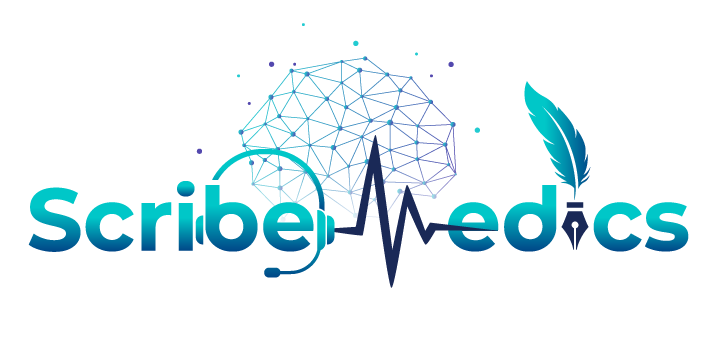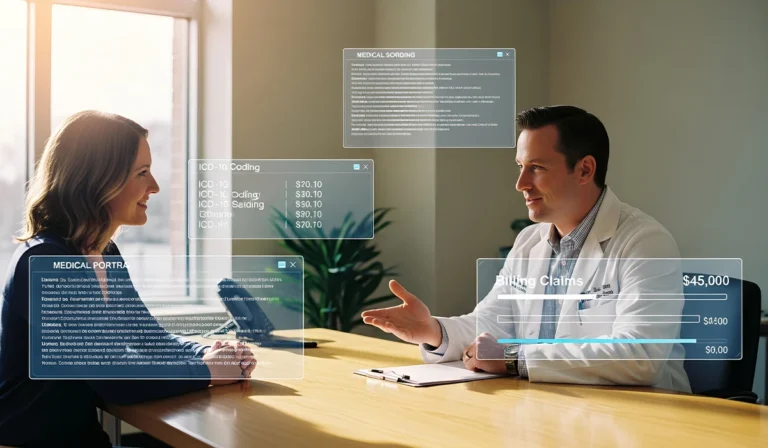Just imagine visiting a cardiology clinic where the physician has absolute eye contact during your consultation, not even a fleeting glance towards a computer monitor or pen and paper. This fantasy becomes a reality with the help of an AI scribe for specialty practices, redesigning healthcare service provision within the United States of America. Current specialty practices no longer inconvenience their doctors with tedious documentation or steal time from patient care.
The evolution of smart AI medical scribe technology from traditional note-taking is a radical improvement in specialty practices’ operations. All multispecialty practices and specialty practices make use of the power of artificial intelligence medical transcription to document everything about patient encounters with unprecedented effectiveness. Specialties’ AI scribes are accustomed to the rich medical lexicon and complicated workflow that is the specialty medicine hallmark, which enables doctors to focus entirely on what’s important, which is their patients.
Here, in this blog, we delve deeper into how specialty-informed tools adjust to oncology and cardiology, aid doctors with an AI scribe for doctors and general medical AI scribe medical models, and liberate teams to deliver better patient outcomes with less clicking and greater presence.
Understanding Specialty Practice Requirements
Specialty practice concentrates on specific fields in medical science that require extremely specialized knowledge and training. Be it oncology, cardiology, ophthalmology, or psychiatry, every field has its own methodology of documenting varied treatment plans, including test results and patient encounters, in great detail.
AI scribes for specialty practices understand these unique needs. Unlike general documentation tools, these advanced systems adapt to the specific language, procedures, and requirements of each medical specialty. This adaptation ensures accurate clinical documentation while reducing the time spent on administrative tasks.
The Rise of AI Scribes in Specialty Practices
A specialty practice is a medical or healthcare practice specializing in a particular field, such as oncology, cardiology, psychiatry, ophthalmology, endodontics, or veterinary medicine. Such high-level specialty practice is needed because of the depth of conditions and treatments.
Traditionally, doctors had to split their time between patient care and entering detailed notes into EHRs. The result? Burnout, reduced patient interaction, and potential errors. Today, AI scribes are changing that equation.
By integrating smart listening, natural language processing (NLP), and sophisticated medical transcription functionality, doctors’ AI scribes make clinical notes in real-time during patient visits. As they listen in, they recognize important information like test results, medication, and symptoms and convert them into structured documentation within seconds.
How AI Medical Scribes Transform Oncology Practices
Cancer medicine requires precision, compassion, and constant vigilance. Oncologists do not merely prescribe and cure, yet they accompany their patients on some of life’s toughest journeys. But coordinated handling of plans of treatments, tracking of side effects, updating of lab results, and recording of rigorous clinical documentation, all of which are combined with some significant patient interaction, can be too much.
This is where AI scribes for specialty services make a key difference in oncology practices.
Precise and Fast Recording of Intricate Conversations
Oncology consultations are all too often prolonged, highly charged emotionally, and highly personal. Doctors must listen carefully, translate symptoms, and modify plans of care, possibly all on one visit. Traditional medical scribe or self-typed notes cannot possibly keep up.
An AI medical scribe oncology solution listens receptively and captures all important information in real time. It identifies oncology-specific terms, comprehends staging and grading terms, and can keep pace with the ever-changing nature of oncology. This guarantees medical scribe accuracy and frees doctors from the hassle of too much typing or manual input.
Improve Patient Outcomes by Prioritizing Presence
With documentation handled by an intelligent AI scribe medical system, oncologists gain back valuable time. They can now focus entirely on their patients’ experiences, offering more eye contact, emotional support, and responsive care. This level of attention boosts patient satisfaction and leads to more thoughtful, customized treatment plans, ultimately improving clinical outcomes.
Building Trust Through Human Connection
Patients battling cancer often crave connection. Seeing their doctor fully present, not glued to a screen, builds trust. By deploying an AI scribe for doctors, especially one designed specifically for oncology workflows, providers can enhance communication, listen deeply, and document seamlessly in the background.
Patients feel heard. Doctors stay engaged. The result? A more compassionate, efficient, and emotionally intelligent practice.
Why Cardiology Needs AI Scribes: Speed, Accuracy & Smarter Workflows
Cardiology isn’t a specialty but a high-stake environment where every second counts. From diagnosing heart attacks to managing chronic conditions like hypertension and arrhythmias, cardiologists face immense pressure to act fast, stay precise, and document everything thoroughly.
That is why heart specialists in America are embracing specialty practices with the help of AI scribes to optimize their workstreams and deliver both higher accuracy and better care.
Understand Cardiac-Specific Terminology in Real-Time
A cardiology scribe AI-dedicated tool doesn’t only transcribe; it interprets. It captures the physician-patient conversation and processes:
- Complex cardiovascular terms
- Real-time changes in treatment plans
- EKG interpretations, imaging, and diagnostic tests
- Important laboratory report and test findings updates
- Notes from emergency care situations
This level of contextual awareness enables the AI medical scribe to create structured, detailed, and error-free notes faster than traditional systems.
Save Time on Documentation and Increase Productivity
With a clinical AI scribe solution tailored for cardiology, doctors decreased manual data input time substantially. Doctors can continue reviewing, signing off, and moving on to the next patient right away. ICD and CPT codes, which are integrated, are automatically pulled out of the clinical discourse, helping with clean billing and reducing claim rejections.
This not only optimizes the revenue cycle but also frees doctors to do what they do best: care for patients.
Increasing Efficiency in High-Volume Practice Settings
During busy clinic hours or hospital rounds, AI scribes for doctors help cardiologists maintain pace without compromising quality. Notes are ready by the end of each encounter, and there’s no need to catch up on charts after hours.
With such tools as cardiology physician scribe systems, American practices are handling greater patient volumes with less fatigue and generating better outcomes.
Psychiatry and Mental Health: Restoring the Human Connection
In psychiatry and mental health care, listening is everything. Patients are sharing their deep, personal, and lengthy narratives. Constantly typing notes during sessions disrupts the flow, leaving patients feeling unheard. That’s why providers are increasingly turning to specialty practices using AI scribes to document content, all while maintaining their attention where it must be: on the patient.
Here are some of the reasons why AI scribes for specialty services are needed:
To Record Sensitive Discussions Without Interrupting
A modern psychiatry AI scribe works unobtrusively in the background. It sits in on sessions, identifies clinical cues, and generates formatted notes of the complete depth of the conversation. From recording changes in behavior to delivering plans of treatment or tracking reactions to medications, the AI medical scribe does all of this with precision, all the while not breaking the therapeutic relationship.
An AI note taker for therapists does more than transcribe speech; it captures the nuances, mood, and content of patient interactions. This enables providers to make meaningful eye contact, respond compassionately, and achieve greater trust.
Improve Accuracy and Reduce Administrative Strain
Mental health records need to be detailed and precise. When something is overlooked, care may be delayed, or insurance claims might become more tedious. Using an ai scribe for psychiatry ensures accurate and timely documentation that goes quite well with the providers’ own EHR system. The new procedure helps increase compliance, boosts patient care, and decreases that backlog of paperwork that tends to cause burnout.
At clinics, private offices, and USA hospitals, AI scribes of mental health solutions are transforming workflows. Psychiatrists, psychologists, and therapists are spending less time at the keyboard and more time interacting. Patients are experiencing uninterrupted therapy, and providers are experiencing a better balance between professional work and personal well-being.
Physical Therapy and Rehabilitation
The world of rehabilitation is built on consistency, observation, and progress tracking. Every session a physical therapist holds should be documented very carefully, including the exercises performed, a change in mobility, or new symptoms shared by a patient. This thorough level of documentation ensures safe recovery but also creates a tremendous amount of paperwork. Hence, an increasing number of rehab facilities across the United States of America are considering AI medical scribes for physical therapy to streamline this process.
Capture Progress Notes in Real Time
During a therapy session, a patient may perform multiple exercises, demonstrate progress, or require adjustments to their treatment plan. Instead of scribbling notes or updating the EHR system afterward, therapists now rely on AI scribes for physical therapy. These tools automatically:
- Record numbers related to range of motion, strength levels, or balance improvements
- Note changes in recovery speed or patient-reported pain levels
- Record therapist instructions for at-home care and follow-up
With automation of this level, the records remain detailed, accurate, and ready for immediate review as soon as the session ends.
Maintain Compliance While Reducing Burden
Insurance companies often want elaborate and structured documentation to approve claims. An omitted entry or an ambiguous progress note could cause reimbursement to be delayed. The use of an AI scribe for physical therapists protects against inaccurate or noncompliant records, thus reducing potential errors. This also builds confidence among the billing parties, that is, the providers, patients, and insurers.
Empower Therapists to Focus on Healing
When AI scribes for specialty practices handle the heavy lifting of charting, physical therapists can spend more time doing what they really love, guiding patients through recovery, instead of rushing to complete paperwork, they can fully pour their energy into supporting structured movements, monitoring progress, and encouraging patients. This, in turn, contributes to an enhanced patient experience, improved outcomes, and a lower rate of burnout among therapists.
In this way, across the USA, by embedding AI medical scribes into their rehabilitation workflows, clinics are reshaping how therapy is being delivered. Combining fast performance with compliance and personalization, these tools thus play an important role in today’s specification practice care.
The Benefits of AI Scribes in Multi-Specialty Practices
Health care organizations that offer multi-specialty practices have special issues to deal with. Each specialty department, such as oncology, cardiology, psychiatric services, dentistry, or rehabilitation, needs its own kind of documentation style. If they don’t have a standardized system, records tend to become inconsistent, time-consuming, and error-prone. That’s why increasing numbers of clinics are implementing AI scribes for specialty practices to introduce structure and simplicity to all departments.
Scale Documentation Across Multiple Specialties
A single AI scribe technology platform can scale to meet individual needs of each department within a medical specialty practice. Whether it is to capture oncology scribe notes, follow patient progress within cardiology practices, or chart therapies within physical rehabilitation, a single system scales effortlessly by specialty. This eliminates varying documentation workflows and frees up time for the whole care team.
Ensure Consistency and Accuracy in Every Note
Consistency matters in healthcare. With AI scribes for doctors, every note follows the same structured format, making records easy to read, review, and share among providers. Built-in intelligence reduces discrepancies by flagging incomplete entries or mismatched medical terminology. This consistency improves AI medical scribe accuracy and ensures that critical details are never lost.
Simplify EHR Integration and Optimize Performance
Most AI medical scribe firms structure their platforms to interface with widely used EHR solutions directly. The interface eliminates duplication and delay by ensuring data flows automatically into every patient’s medical chart. Clinics enjoy smoother workflows, quick reference to data, and enhanced AI medical scribe productivity throughout departments.
Lessen Errors and Decrease Administrative Burden
By automatically verifying inconsistencies and omitted data, AI scribes for specialty practices eliminate expensive documentation errors. They also reduce administrative tasks for physicians to a minimal level, freeing up more time for patient encounters and less time sitting at a computer station.
Across the USA, leading medical specialty practice groups are proving the value of AI scribes for specialty practices. From enhancing clinical documentation to boosting overall efficiency, these systems help clinics scale operations, improve accuracy, and strengthen the patient experience, all while reducing burnout for healthcare providers.
The Impact of AI Scribes on Patient Care and Clinical Efficiency
Throughout America, medical practitioners are experiencing tremendous enhancements following the implementation of AI scribes for special practice use. They don’t just capture notes; they redesign physicians’ mode of care and engagement with patients.
Reduce Burnout and Reclaim Time
Physicians spend less time buried in documentation and more time focusing on their patients. By using an AI note taker, Scribe AI, doctors cut down late-night charting sessions, which reduces stress and prevents burnout.
Enhance Patient Engagement
As paperwork is managed behind the scenes, doctors are able to make eye contact, listen actively, and develop trust with patients. Patients can sense whether doctors are present with patients during patient visits; this element strengthens patient care overall.
Work Smarter with Document Imaging Solutions
AI scribe medical solution records conversations in real-time and converts them to structured notes. The records smoothly integrate with the EHR system, enhancing clinical documentation accuracy and compliance.
Increase Revenue and Productivity
As the system recognizes medical terminology and extracts billing codes automatically, providers enjoy higher accuracy and fewer claim denials. This leads to increased revenue and greater efficiency across the practice.
Improve Team Collaboration
All the records are maintained within a central medical record; care groups share information right away. Coordination and communication among specialties are facilitated all the more, especially within multi-specialty practices.
The influence of incorporating an AI medical scribe reaches beyond administrative work reduction; it raises care provision to a higher level, fortifies patient confidence, and supports successful practices within the United States.
The Future of Specialty Practice Documentation
AI scribe technology is regularly enhanced to cope with growing demand within America-based specialty practices. Hybrid AI medical scribe solutions combine artificial intelligence productivity with human oversight to provide the best-level accuracy for high-level specialty documentation.
Leading AI medical scribe companies like ScribeMedics provide comprehensive solutions that address the unique needs of specialty practices. These companies offer specialized training, ongoing support, and customized implementations that maximize the benefits of AI scribe technology.
Conclusion
AI scribes for specialty practices are a breakthrough in medical documentation. Across specialties from cardiology and oncology to psychiatric and veterinary medicine, specialty solutions respond to each medical specialty’s distinctive requirements to enhance patient care and provider satisfaction.
As healthcare keeps moving forward, medical scribe technology will increasingly support specialty practices around the USA. Lessening administrative burden and offering more complete documentation will allow the healthcare providers to concentrate on what really matters: superior patient care.
With the investment in AI scribing for physicians and other healthcare professionals, an emphasis is made on operational efficiency and patient outcomes. Specialty practices adopting this technology are setting themselves up to thrive in an increasingly complex medical landscape.
Frequently Asked Questions
AI Scribe is a high-tech digital assistant that captures conversations during patient interactions and produces genuine notes instantly. As compared to conventional typing or manual transcription, an AI medical scribe utilizes AI scribe technology and natural language understanding to capture clinical documentation effortlessly. It is familiar with medical terms, interfaces with EHR software, and enhances overall productivity. Clinics all over America are implementing AI scribes for special practices to decrease paperwork, avoid errors, and provide a better patient experience. The software even accommodates specialized fields such as oncology, cardiology, psychiatric problems, and veterinary practices, which render it effective for contemporary health care
The main role of a medical scribe is to handle documentation so doctors can focus on patients. In traditional settings, a human scribe typed notes, entered lab results, and updated medical records. Today, an AI medical scribe or AI note taker performs these tasks automatically with high accuracy. The role goes beyond typing; it ensures every patient encounter is properly recorded, every treatment plan documented, and every test result added to the record. By using AI scribes for specialty practices, providers in the USA save time, reduce burnout, and deliver more attentive patient care across multiple specialties.
Specialty practice is a medical clinic or medical department that is specialized within a medical specialism such as cardiology, endodontics, psychiatric practices, veterinary practice, or oncology. They all require specialized documentation, complex knowledge, as well as highly accurate records. Administrative management of such records may be too burdensome without AI scribes. As such, more and more clinics apply AI scribes for specialty practices to automate clinical documentation. The software accommodates specialty-based medical terminology and alters plans of treatment, as well as makes medical records normalized. Whether within a multi-specialty practice or within a single-specialty clinic within America, AI scribes streamline operations as well as deliver enhanced patient care.
A cardiology scribe assists heart specialists by charting clinical information during office visits with patients. Previously, human scribes entered EKG interpretations, revised plans of treatment, and processed test results. Now a cardiology scribe artificial intelligence, or AI scribe, medical system handles those duties in real time. It recognizes cardiovascular medical terms, records emergency care notes, and interfaces directly into the EHR system. Throughout America, cardiologists now employ AI scribes for specialty practices to reduce time, lessen manual entry, and enhance medical scribe accuracy. It allows physicians to focus on high-risk patients, become more efficient, and enhance patient interaction within busy cardiology practices.
The “best” specialty to scribe for depends on personal preference and workflow needs, but certain fields highlight the benefits of AI scribes for specialty practices more clearly. Specialties like oncology, cardiology, psychiatry, and physical therapy often involve complex documentation, long treatment plans, and constant monitoring of test results. In these areas, an AI medical scribe dramatically reduces documentation time and improves accuracy. For some, veterinary AI scribe tools are best because they adapt to unique animal care needs. Ultimately, the best specialty to scribe for is where documentation is heavy, and AI scribe technology can free providers to focus on patients.
A successful medical scribe, whether human or AI, reduces administrative burdens for providers. Documenting all patient encounters, tracking plans of care, and completing medical records frees doctors to concentrate on care. An AI medical scribe takes this a step further by doing all this at increased speed and accuracy, pointing out errors, and sending data directly to EHR systems. Throughout the USA, providers experience lowered burnout, enhanced patient engagement, and increased time with patients. Specialists with AI scribes for special practices benefit from enhanced productivity for doctors, enhanced billing accuracy, and increased job satisfaction, all with a reinforcement of the overall patient experience.
The perks of medical scribes, particularly AI ones, are quite many. They are time savers as they handle documentation, enhance clinical documentation integrity, and provide seamless EHR integration. Physicians don’t have to type during clinical visits anymore, enhancing engagement and confidence. A medical scribe AI decreases after-hours charting and prevents burnout as well. United States of America practices enjoy increased efficiency, quicker note completion, and clean billing with structured entry. Multi-specialty practices witness AI scribes adjusting within departments with records remaining uniform throughout. Providers give patients superior care and have more efficient and profitable clinics by leveraging AI scribes for specialty practices.
The benefits of using AI scribes for specialty practices are clear: reduced paperwork, faster documentation, and better patient care. These tools adapt to specific fields such as oncology, cardiology, psychiatry, and veterinary practices, capturing specialty-specific medical terminology and creating accurate notes in real time. They improve AI medical scribe accuracy, reduce errors, and ensure smooth EHR integration. Providers across the USA report less burnout, stronger patient interaction, and increased revenue due to better billing accuracy. Whether in a multi-specialty practice or a single-specialty clinic, AI scribes streamline workflows and give doctors more time to focus on healing.
Yes. Modern AI medical scribe companies design systems to adapt to complex specialties such as neurology, orthopedics, and beyond. These tools are trained on large datasets of medical terminology and specialty-specific workflows. For neurologists, an AI medical scribe captures seizure details, test interpretations, and care adjustments. For orthopedics, it records surgical notes, progress after physical therapy, and diagnostic imaging results. Clinics in the United States report that AI scribes for specialty practices handle even the most advanced cases with precision. By improving AI medical scribe performance across multiple disciplines, they help doctors reduce errors and deliver stronger patient outcomes.
The best AI scribe for doctors is one that adapts to their specialty, integrates with existing EHR systems, and delivers high medical scribe accuracy. Solutions like ScribeMedics provide hybrid AI medical scribe models that combine AI efficiency with human oversight, ensuring flawless clinical documentation. For mental health, the best AI scribe for psychiatry captures sensitive conversations without disruption. For general care, the best AI scribe for family medicine handles broad documentation needs. Across America, providers agree that the best systems are those that scale across multi-specialty practices and give doctors more time for meaningful patient interaction.
Dinesh Kumar is a healthcare workflow architect and clinical documentation expert with over a decade of real-world experience supporting physicians across multiple specialties in the United States. As the Co-Founder of ScribeMedics, he has helped transform how medical practices handle documentation, coding, and administrative workflows, reducing burnout, improving patient flow, and enabling clinicians to reclaim their day.
Since 2013, Dinesh has worked closely with providers on the front lines of patient care. Over the years, he witnessed a recurring problem: clinicians were drowning in administrative work, spending hours after clinic hours updating charts, reconciling notes, and managing documentation backlogs. Instead of accepting this as “part of the system,” he decided to fix it.
Under his leadership, ScribeMedics has grown into a global hybrid scribing and documentation support company known for accuracy, compliance, and reliable workflows. From medical scribes and CPC-certified coders to virtual back-office support, his teams help multispecialty practices increase revenue integrity, reduce charting time, and improve patient-physician satisfaction.
Dinesh works with healthcare providers, practice owners, and attorneys who want streamlined documentation, better reimbursement outcomes, and more efficient operations. His approach blends empathy, process engineering, and deep domain expertise to create systems that work, day after day.
When he isn’t optimizing clinical workflows, Dinesh mentors documentation teams, trains young professionals, and speaks about burnout prevention, workflow design, and the future of hybrid AI-driven scribing.









 Medical Transcription
Medical Transcription Medical Billing
Medical Billing Medical Coding
Medical Coding